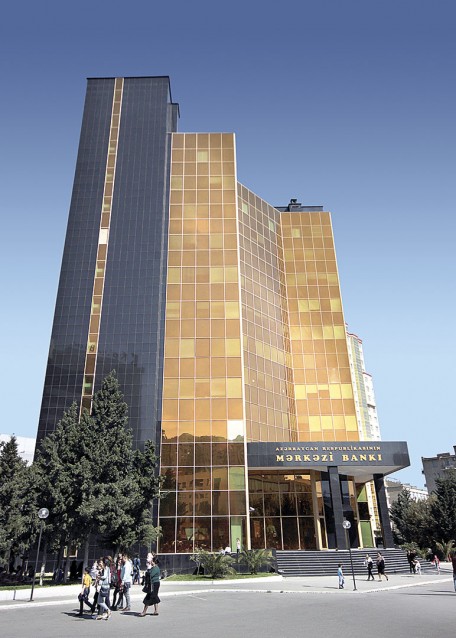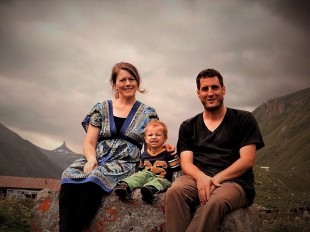The main forecast for the Azerbaijani economy in 2017 was that it would be a year of recovery. In other words, that the decline observed over the last two years would stop and a process of stabilisation would set in. Although macroeconomic stability was preserved in the aftermath of the oil price plummeting more than 50 per cent in 2015, the economy nonetheless found itself in a fragile state and was in danger of deteriorating yet further in 2017.
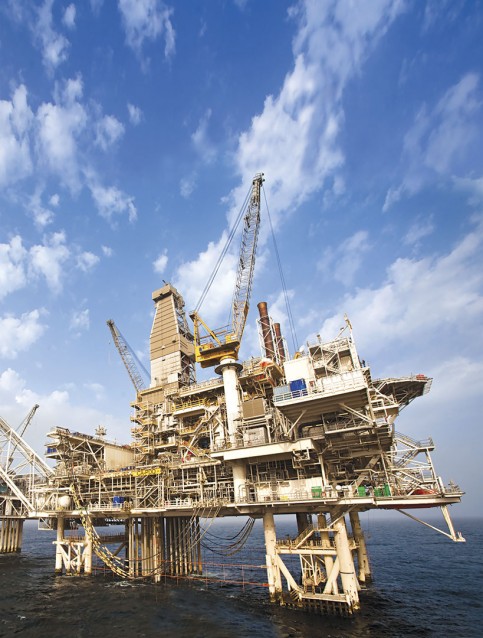 An oil platform in the Azeri-Chirag-Guneshli field, the oilfield at the centre of the Contract of the Century. Photo: courtesy of BP
An oil platform in the Azeri-Chirag-Guneshli field, the oilfield at the centre of the Contract of the Century. Photo: courtesy of BP
However, recovery measures that the government started taking in early 2016 made it possible to make quite optimistic forecasts for 2017. The measures included introducing more sophisticated management techniques, transitioning to a policy of cost-cutting across sectors, modernising taxation policy and further tightening of monetary and credit policies. The softening of external economic impacts beginning in the latter half of 2016, not least with the stabilisation of oil prices due to the well-concerted efforts of oil producing countries to reduce oil production, was also significant.
And these forecasts began to be fulfilled from the first month of the year, as the companies, organizations and private businesses operating in the country registered a Gross Domestic Product (GDP) worth AZN 5,233.1 million, or 0.8 per cent more than in the same period of 2016. In the first quarter of 2017, GDP amounting to AZN 15,229.7 million, or AZN 1,570 per capita, was produced. However, while the value added generated in the non-oil sector of the economy in this period increased by 2.4 per cent compared to the same period of last year, in the oil and gas sector it dropped by 6.8 per cent.
Although the value of the manat in relation to the dollar depreciated by 8.23 per cent in January, the “fire” on the currency market began to be extinguished in February. Since then the official currency reserves of the Central Bank (CBA) began to increase, and this trend continued throughout the year. Prior to this, at the beginning of the year CBA reserves had declined and even crossed the dangerous “psychological threshold” of $4 billion, dipping to $3.9744 billion. At present, CBA reserves have recovered to $5.254 billion, representing an increase by $1.279 billion over the course of the year.
In general, this year will be remembered for its successful economic performance. A surplus was achieved in the country’s balance of payments, which is regarded as the main precondition for stabilization on the currency market. The growth rate in the non-oil sector reached 2.5 per cent, in industry more than three per cent and in agriculture over four per cent. Despite the negative impact on the GDP caused by the decline of the oil price, the non-oil sector still accounts for 70 per cent of it. Efforts towards maximizing the efficiency of the country’s export potential have also begun to yield results and the volume of non-oil exports gradually continues to increase.
As far as the most positive economic events of the year are concerned, here are the three most important:
Climbing the ratings
First, in comparison with last year, Azerbaijan has climbed the rankings on a number of international reports, including Doing Business 2018, an annual report prepared by the World Bank and International Finance Corporation since 2003, which measures the ease of doing business throughout the world based on a number of indicators.
According to this Azerbaijan is currently ranked 57th among 190 countries, scoring 70.19 of a possible 100 points. The country’s position on six out of 10 indicators has improved: in terms of “getting electricity” the country has climbed three places, in terms of “registering property” by one place, in terms of “protecting minority investors” by 22 places, in terms of “paying taxes” by five places, in terms of “enforcing contracts” by six places, and in terms of “resolving insolvency” by 39 places.
According to the Doing Business 2017 report, Azerbaijan scored 68.0 points, finishing in 65th place, which was similar to its 2016 performance (67.8 points, 63rd place). For comparison’s sake, the country finished 2015 in 80th and 2014 in 70th place. It seems likely that Azerbaijan will advance further in the coming years.
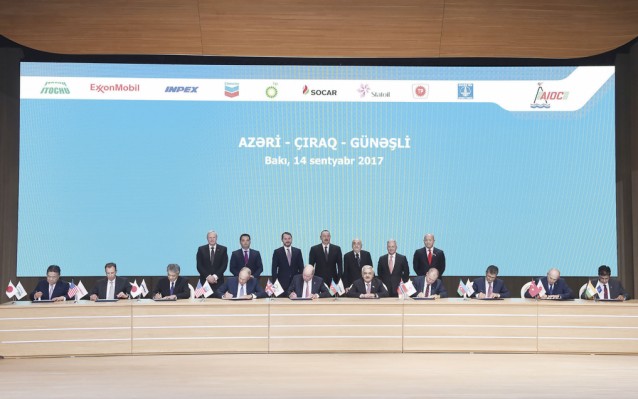 On 14 September a new contract governing oil production in the Azeri-Chirag-Guneshli field was signed in Baku in the presence of President Ilham Aliyev and a group of visiting senior government and state officials, by Rovnag Abdullayev, President of SOCAR, on behalf of the Azerbaijan Government, and by the represen- tatives of the co-venturer companies. Photo: president.az
On 14 September a new contract governing oil production in the Azeri-Chirag-Guneshli field was signed in Baku in the presence of President Ilham Aliyev and a group of visiting senior government and state officials, by Rovnag Abdullayev, President of SOCAR, on behalf of the Azerbaijan Government, and by the represen- tatives of the co-venturer companies. Photo: president.az
Contract of the New Century
Secondly, a significant event occurred in Azerbaijan’s oil and gas sector in 2017. A new contract was signed on 14 September 2017 for the further development of the Azeri-Chirag-Guneshli (ACG) oilfield, extending the original contract, known as the Contract of the Century and signed on 20 September 1994, until 2050.
Of course, the Contract of the Century was also extremely beneficial for the country, paving the way for its post-Soviet economic development, as the best possible conditions were secured for the time. It was signed by 12 companies from eight countries for a 30-year term; the total volume of investment was $7.4 billion. ACG has delivered around 3.2 billion barrels of oil to world markets since the first oil was produced on 7 November 1997.
But the conditions of the new contract are even more advantageous. The main essence of them is that Azerbaijan’s participating interest has been increased from 11 to 25 per cent and the country will receive 75 per cent of the profit oil. SOCAR, the State Oil Company, will act as the contractor for the new contract and foreign oil companies will pay Azerbaijan a one-off bonus of $3.6 billion. Summarising the significance of this new deal, Bob Dudley, BP’s group chief executive, said:
Over the past 23 years the Contract of the Century has truly transformed Azerbaijan, energy supplies to Europe and all of us who have worked so hard to make it a success. Today’s contract is perhaps an even more important milestone in the history of Azerbaijan as it ensures that over the next 32 years we will continue to work together to unlock the long-term development potential of ACG through new investments, new technologies and new joint efforts to maximise recovery. In light of that, I think it is fair to call this the Contract of the New Century.
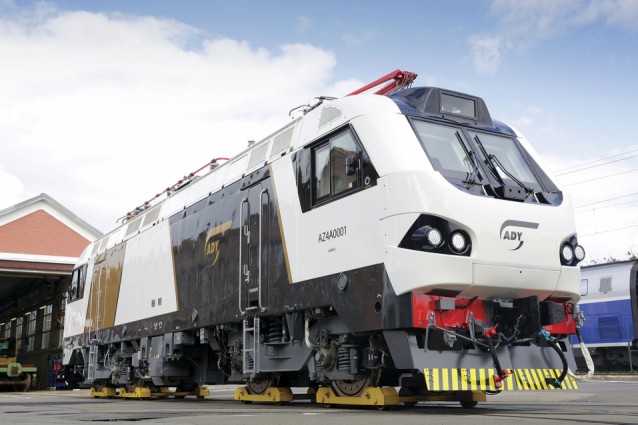 The Prima M4 locomotive built by French company Alstom for Azerbaijan Railways to serve Azerbaijan’s expanding railway projects. Photo: Azertaj
The Prima M4 locomotive built by French company Alstom for Azerbaijan Railways to serve Azerbaijan’s expanding railway projects. Photo: Azertaj
Baku-Tbilisi-Kars
The third most important economic event of the year was the launch of the Baku-Tbilisi-Kars (BTK) railway, the foundations for which were laid in February 2007. The opening ceremony was finally held on 30 October 2017. The project is part of a wider attempt to revive the Great Silk Road, which will also benefit China, Kazakhstan, the Central Asian republics and European countries. A 504-km section of the 850-km railway passes through the territory of Azerbaijan.
The BTK project was initially not regarded as feasible due to a lack of technical capacity and financial resources. A total of $650 million was invested in the railroad, although besides Georgia, Turkey and Azerbaijan, no other countries invested in it. If other countries had shown greater interest and taken it more seriously, it would have taken less than 10 years to implement.
Five million tonnes of cargo and a million passengers will be transported along this railway at the initial stage, which is forecasted to climb to 17 million tonnes and three million passengers at a later stage. Its launch means there is now a railway link from China to Europe and its most distant capital London, dramatically increasing the speed of transporting goods from East to West. Azerbaijan’s transit opportunities look very competitive both from the point of view of distance and low transit rates.
As for 2018...
2017 has seen the beginning of trends towards economic revival and there are good prospects for the continuation of this recovery in 2018 as well.
About the author: Parviz Heydarov is an independent journalist specializing in economic analysis.